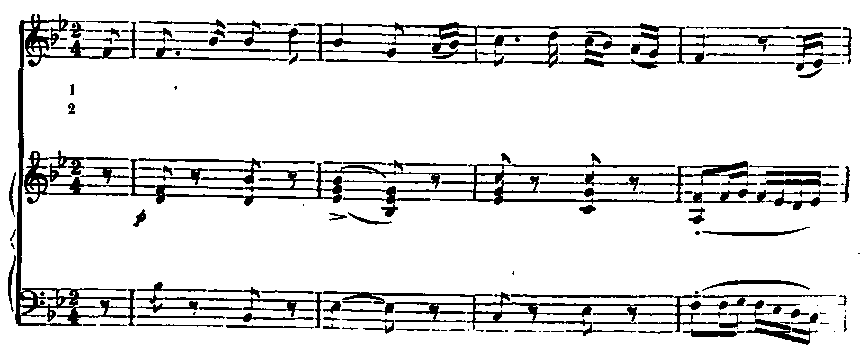Familiar Songs - Their Authors & Histories
300 traditional songs, inc sheet music with full piano accompaniment & lyrics.
| Share page | Visit Us On FB |
|
176 OUR FAMILIAR SONGS.
miss horseshoes, and, finally, thirty were gone. He had tried in vain to find the thief, when, one day, he heard musical sounds proceeding from the top of the building. He followed the notes, and lighted upon little Davy, sitting between the ceiling and the thatched roof, with a fine assortment of horseshoes strewn about him. Of these, he had selected eight, and suspended them by cords so that they hung free, and with a little iron rod he was running up and down his clanging octave, after the fashion of the village chimes. The incident became known, and resulted in his obtaining thorough musical training. After finishing a course of study with a famous organist of Exeter Cathedral, he went to London, and became performer in the orche'stra at Covent Garden Theatre, giving lessons at the same time. He wrote the music to Holman's opera, " What a Blunder!" and other successful pieces. Incledon, the famous tenor singer, was waiting for a friend in a public house at Wapping, when he heard some sailors singing an air that struck his fancy. He hummed it to Davy, who foimded upon it the air of the "Bay of Biscay." Incledon used to sing the song with marvellous effect. Davy died in 1824.
Mr. Henry Phillips says: " One thing connected with the song, ' The Bay of Biscay/ always perplexed me; namely, why it was called 'The Bay of Biscay 0!' I enquired, but no one could explain the mystery to me. I looked into my geography book, and did not find it there. Some one, at length, proposed a solution of the enigma, by saying, that the marines— who were not good sailors—might have crossed those waters, and feeling very ill from the roughness of the passage, enquired their whereabouts by saying 'Is this the Bay of Biscay?—Oh!!!' This appeared so very likely, that I adopted it as a fact." Phillips made his debut with this song when he was but eight years old, in a country theatre. The little tail of his jacket was sewed up, to turn him into a tar, and directions were given not to let the audience see the hump on the back, produced by this ingenious method of creating a British seaman. He says: "The scene was set: an open sea, painted on the back of some other scene, where the wood-work was more prominent than the water, and unmistakable evidence of a street door appeared in the middle of the ocean. All was ready; tinkle went the bell; up went the curtain, and the glorious orchestra, which consisted of two fiddles and a German flute, struck up the symphony. As I strutted on, in the midst of a flash of lightning—produced by a candle and a large pepper-box filled with the dangerous elements—I began my theme—'Loud roared the dreadful thunder/ pointing my finger toward the left-hand side of the stage, as if the storm came from that direction, which unfortunately it did not. At the termination, I was loudly applauded; the whole company shook hands with me, all the ladies kissed me, and, in fact, I was the lion of the evening." The syllable comes from the Spanish form of the word Vizcaya, being retained because the open vowel is of advantage to the singer.
Moderate
. Loud roard the dread - ful thun - der, The rain a del - uge show'rs, The
. Now dash'd up - on the bi] - low, Her op - 'ning tim - bers creak, Each |
||
 |
||